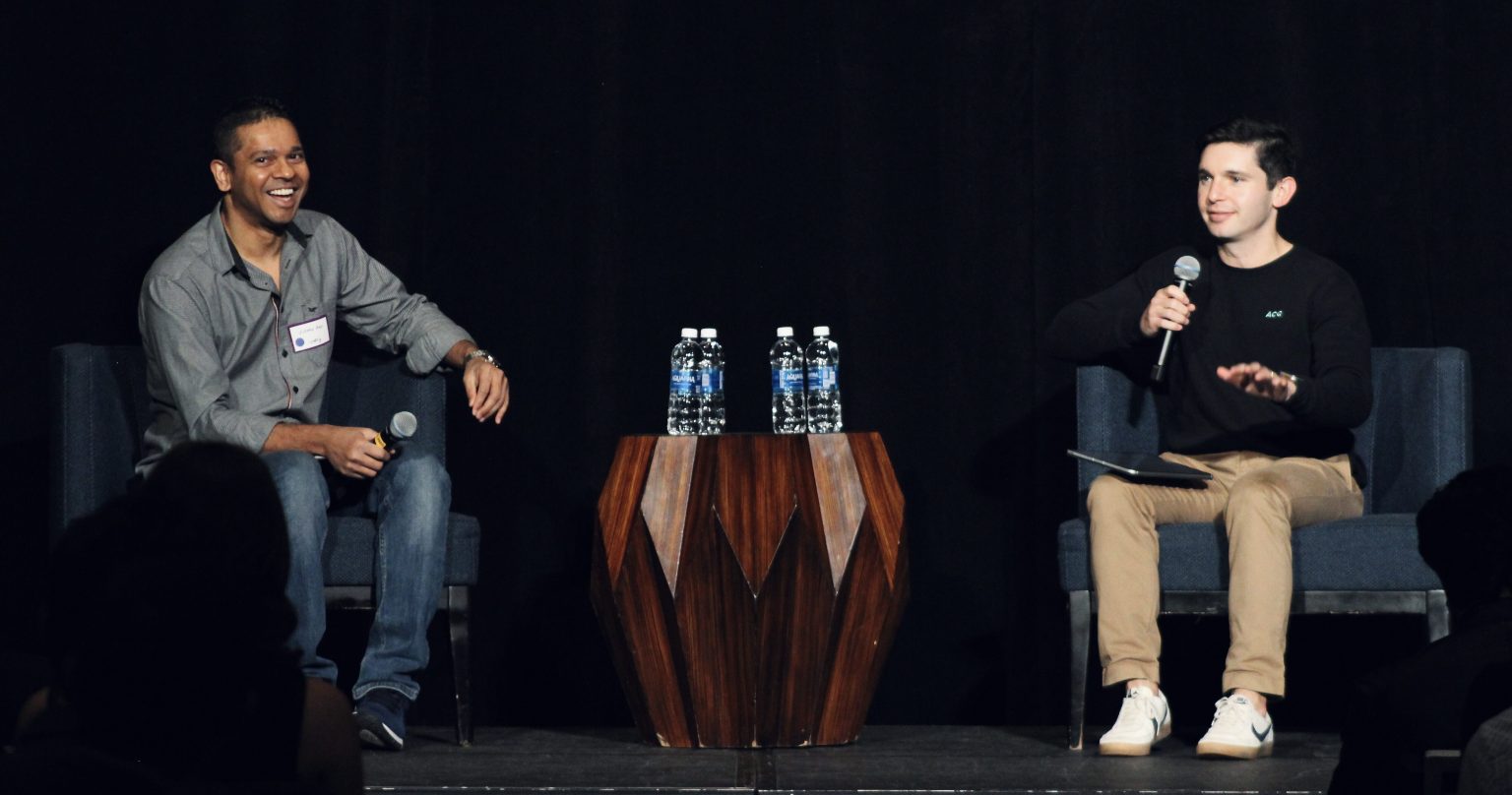Summarize this content to 2000 words in 6 paragraphs
Stastig CEO Vijaye Raji (left) and Acquired podcast co-host Ben Gilbert speak on stage at the Seattle Startup Summit on Friday. (GeekWire Photo / Taylor Soper)
It was a typical drizzly and grey morning in Seattle as hundreds of software developers gathered for a startup conference to share best practices and learn about new AI tools.
“You’re not out there on the beach in the sun playing volleyball,” said Vijaye Raji, a longtime Seattle tech leader and CEO of Statsig.
“It’s a great day to be productive,” quipped Ben Gilbert, another Seattle startup vet and co-host of popular business podcast Acquired.
Weather aside, Raji and Gilbert spoke on stage Friday at the inaugural Seattle Startup Summit about the strength of the city’s tech ecosystem amid the AI boom — and opportunities for more startup creation.
Cloud computing giants Amazon and Microsoft — two of the four largest companies in the world — are based in the Seattle region, as well as a bevy of leading AI-focused research organizations and a top computer science school at the University of Washington.
Raji said he sees the creation of profound AI applications coming from sectors such as disease research and biotech.
Seattle is also the home of Fred Hutch, the UW’s Institute for Protein Design, and many other groups developing cutting-edge science and medicine.
“If you think about Seattle, it’s uniquely positioned to bring all of those together,” said Raji, who previously led operations for Meta’s Seattle hub — one of more than 100 satellite engineering offices in the region.
Seattle has almost a quarter of America’s AI engineers, according to some estimates. And it’s consistently ranked among the top global cities when it comes to tech talent.
Raji called it a “quiet talent” that may be under-appreciated.
“It’s kind of good for us, because we’re constantly hiring, and I think the Seattle talent is really good,” said Raji, whose company is ranked No. 9 on the GeekWire 200, our list of top Pacific Northwest startups.
Yet the startup activity in Seattle still pales in comparison to Silicon Valley, or even other places like Los Angeles and New York, as measured by companies created and money raised from venture capitalists.
The delta between tech expertise and startup creation is a weird phenomenon, said Gilbert, who helped launch Seattle startup studio Pioneer Square Labs. He suggested there could be more celebration of people leaving big tech companies to make the startup leap.
Instead of applauding a 10-year anniversary at Microsoft, for example, perhaps the reaction should be instead to ask “when are you going to do something interesting,” said Gilbert, a former Microsoft program manager.
And given the speed and efficiency at which startups can get off the ground and grow in the age of AI, there could be even more opportunity for talented tech workers to jump into entrepreneurship.
“This is the coolest time ever to have a singular vision, because there are certain companies where you don’t need a large team to execute and create something really valuable,” Gilbert said.
Other tidbits from the conversation:
Raji on getting customer feedback: “One of the things that I always believe in: the faster you can get out of the vacuum and build based on feedback, you will build a product that people want. You will build something that people would want to pay money for.”
Gilbert on Acquired’s slow and then sudden growth: “You just need to make it through years and years of irrelevance. Even if the growth rate is high, in the world you are irrelevant. … If you’re doing something that customers like, you kind of need to just exist long enough for the world to say, ‘Oh, they’re trustworthy.’ … There’s some sort of magic around the six, seven-year mark, where people just believe that you’re going to be around for a long time.”
Raji on his biggest lesson from Meta: “The biggest thing I learned at Facebook is humility … there’s a lot of product intuition you learn over the years, but what I’ve also realized is products have gotten so much more complex, the abstractions that we now work on top of are so much richer, and it’s impossible for one person to fully understand the ramifications of new product features. Facebook was this personification of collect data, instrument everything, and then learn from how people use the product — don’t assume what’s going to happen. Data is the biggest feature of humility. And so I learned to rely on data, and not just on intuition.”
Gilbert on the common thread in successful companies: “Our study (at Acquired) is what causes you to be an extreme outlier … I would say every single founder of a TSMC or a Rolex or an Hermès or a Costco is extreme in some way, but they’re all extreme in different ways. And I think it’s about aligning the way in which you are extreme, with a skillset to build a particular product for which there is a market, and the right culture to run a company like that.”


